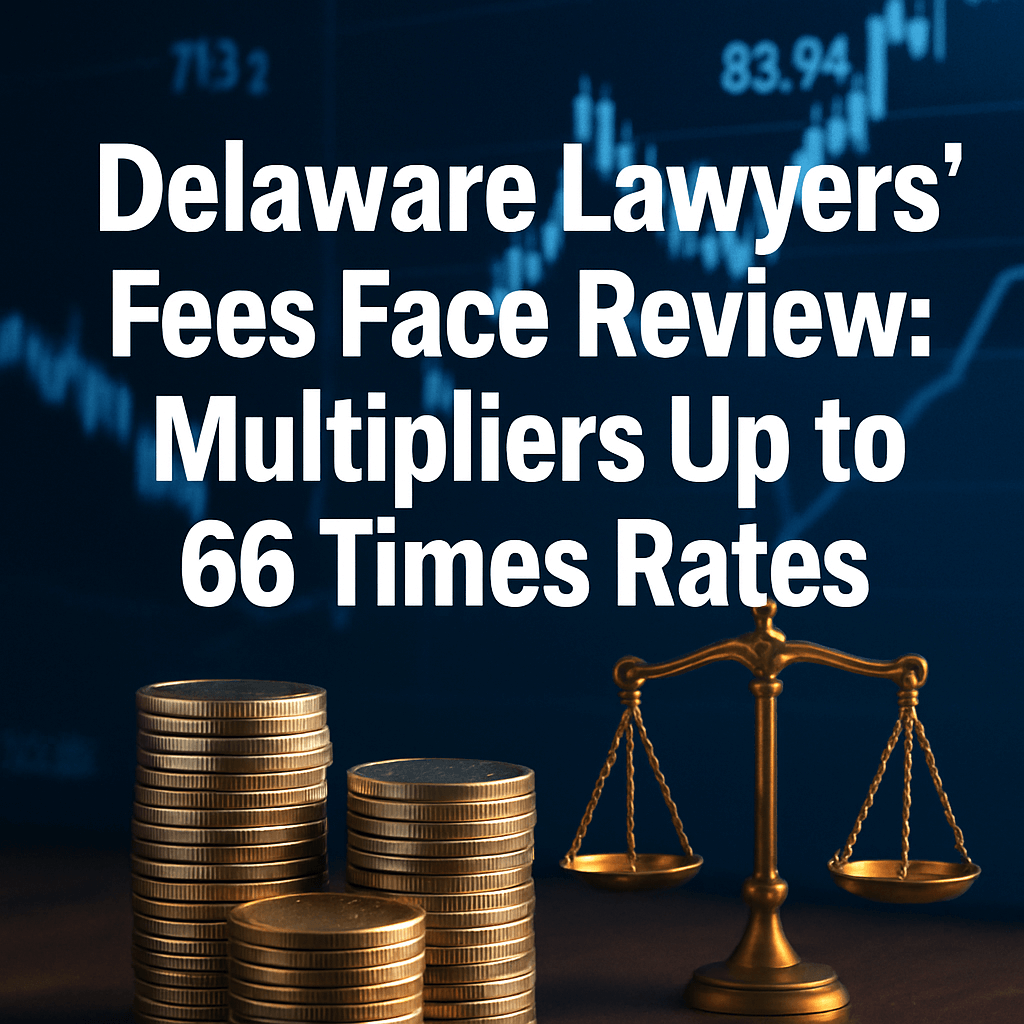Delaware Lawyers’ Fees Face Review: Multipliers Up to 66 Times Rates

A recent study has triggered significant concerns regarding the escalating legal fees being awarded to attorneys handling corporate cases in Delaware. The research reveals that lawyers are earning as much as 66 times their standard hourly rate when representing major corporations, prompting a wave of criticism from the venture capital community.
Study Findings: An Alarming Trend
Conducted by Joseph Grundfest, a professor at Stanford Law School, the study meticulously analyzed shareholder cases filed in Delaware since the year 2000. The report highlights a troubling trend: over the past five years, the frequency of attorneys receiving payouts of 10 times their normal hourly rate (decuples) was reported to be more than 57 times higher than similar cases in federal courts. Moreover, the incidence of lawyers receiving septuple multipliers (7 times their hourly rate) was found to be 23.35 times more prevalent in Delaware compared to federal jurisdictions.
If the Numbers Shock, the Real Rates Astonish
One striking case reported saw an attorney’s hourly billing soar to an astonishing $35,000, underscoring the drastic nature of these fee multipliers. Such exorbitant rates have raised concerns among various stakeholders, particularly amid ongoing discussions regarding corporate governance and the cost of doing business.
The Venture Capital Response: DExit Movement
The implications of Grundfest’s findings are reverberating through the venture capital landscape, as noted by prominent investor Bill Gurley. During a podcast with fellow investor Brad Gerstner, Gurley voiced strong concerns over the Delaware judiciary’s apparent activist tendencies. “There’s an activist mentality in the Delaware courts,” he stated, adding, “This is radically different than why I was told businesses should go to Delaware.”
- Gurley is advocating for the “DExit” movement, encouraging companies to reconsider their incorporation in Delaware and explore options in states like Texas or Nevada, which are increasingly seen as more favorable environments for corporate governance.
- Recent shifts by high-profile firms, including Tesla’s move to Texas and comments from investors like Bill Ackman suggesting his hedge fund will reincorporate outside of Delaware, lend further weight to this growing trend.
Musk’s Influence and Corporate Migration
Elon Musk’s decisions to relocate both Tesla and SpaceX have spotlighted the issues within the Delaware judiciary. Musk has been vocal about his belief that the state’s judicial system lacks impartiality, labeling Chancellor Kathaleen McCormick as an “activist and politician.” Such high-profile critiques could catalyze further corporate migration, particularly as firms weigh the financial implications of Delaware’s burgeoning legal fees against operational efficiency and legal predictability.
Context: The Legal Landscape in Delaware
Delaware has long been regarded as the corporate capital of the United States, boasting a unique combination of comprehensive case law, efficient specialized courts, and a business-friendly regulatory environment. However, the current findings raise questions about the reliability of this framework.
Judicial Influences:
The study highlights that the vast majority of substantial fee multipliers originated from decisions made by a small cohort of Chancery Court judges. With 21 septuple multipliers and 14 decuples recorded in the five-year window analyzed, concerns regarding judicial consistency and predictability arise. The court’s historical reputation as a stable and predictable venue for corporate governance now seems at risk of being undermined.
What Lies Ahead for Delaware?
As discussions regarding potential reforms begin, Delaware’s governor, Matt Meyer, has expressed a commitment to collaborating with corporate leaders to reassess the current landscape. Meyer stated earlier this year, “We need to be forward-thinking and maybe do things a little differently to make sure we retain that status as the preeminent jurisdiction of choice for corporations around the world for many years to come.”
While it’s uncertain how far these reforms will extend or whether they will effectively curb the issue of excessive legal fees, one thing is clear—the pressure on Delaware to maintain its standing as a premier corporate venue is mounting.
The implications of Grundfest’s study could serve as a catalyst for significant shifts in corporate strategy, as stakeholders re-evaluate the costs and benefits of being incorporated in Delaware.
Conclusion
Delaware’s legal environment is at a pivotal juncture. The findings of the Stanford study have ignited a broader conversation about legal costs and corporate governance, forcing companies to reassess their options in an increasingly competitive landscape of corporate incorporation.
“This shows that chaos is being built into the system and it’s a recent development.” – Bill Gurley
Source: fortune